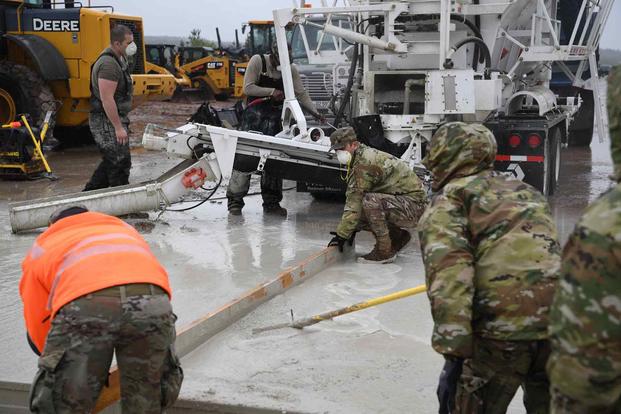Air Force officials told Congress on Tuesday to expect a big ask for military construction in the service's fiscal 2022 budget request -- funding they say is necessary after deferring projects for years.
Brig. Gen. William Kale, the Air Force's director of civil engineers, told a House Appropriations subcommittee that the service has struggled over the last several years to manage any military construction projects that weren't related to rebuilding Tyndall Air Force Base, Florida, and Offutt Air Force Base, Nebraska, which were struck by natural disasters in 2018 and 2019, respectively.
But, he added, the service has made "great strides in improving our processes ... increasing the likelihood of successful project awards and execution" to address a $30 billion backlog in maintenance and repairs.
Read Next: Two US Military Pilots Eject from Qatari F-15 at Illinois Airport
"I expect our fiscal year 2022 [military construction] requests to be a significant improvement from fiscal year 2021 and return to a level consistent with recent requests," Kale told the subcommittee responsible for funding the Department of Veterans Affairs, military construction and related agencies.
That request should be included in President Joe Biden's fiscal 2022 budget proposal, expected to be published May 27.
Kale said the service has built databases to track facility conditions and is implementing a plan developed in 2019 -- its infrastructure investment strategy, or I2S -- that calls for establishing a "stable funding platform" of 2% of replacement value, with an ultimate goal of 2.3%.
He added that the service is working to consolidate and shed facilities to reduce its footprint and looking at "innovative solutions" for maintaining infrastructure and making improvements.
"We had a huge dip in our [military construction] investment because our program was not in a place where we were able to execute projects in a timely manner," Kale said. "I will tell you compared to [fiscal] '21, [fiscal] '22, there is a significant change you'll see coming."
Twenty years of neglect at Air Force installations across the globe have left a backlog of repairs to buildings, runways, heating and air conditioning systems, and other infrastructure needed to support airmen, according to officials.
Kale said the service is grateful for the funding it received to rebuild Tyndall and Offutt and is doubling down to harden its installations to the effects of climate change.
It is designing new buildings at all facilities to withstand sustained winds of 165 miles per hour -- higher than those of Hurricane Michael, which destroyed Tyndall -- and designing facilities to be 14 to 19 feet above today's mean sea level.
"Last year, we published a severe weather and climate hazard screening and risk assessments playbook, which gives installation planners a consistent framework to screen for severe weather and climate hazards and assess current and future risks," explained Jennifer Miller, acting assistant secretary of the Air Force for Installations, Environment and Energy.
"We've completed initial assessments at all major installations, and we'll be incorporating results into our installation development plans over the next several years," she said.
The Air Force's military construction budget request was $1.4 billion in fiscal 2021, down from the $2.3 billion it asked for the previous year (the service received a total of $5.3 billion in funding from Congress for military construction to address the destruction at Tyndall and Offutt and fund other related projects).
Subcommittee Chairwoman Rep. Debbie Wasserman Schultz, D-Fla., described conditions at bases she has visited as "atrocious" and told the service it must address its infrastructure problems, to include rebuilding child development centers or expanding child care options in order to provide airmen the stability they need to do their jobs.
"Your service members have shown us and the committee on our travels -- where you have airplane hangars being held together with duct tape and coat hangers, doors that are about to fall off -- conditions of many of these facilities really being dangerous," Wasserman Schultz said.
Joining in the scolding was Rep. John Carter of Texas, the subcommittee's ranking Republican, who told the Air Force officials that if "they don't ask," they don't get" the necessary funding to make improvements.
"We're not magicians," he told Kale and Miller. "Why aren't you asking to fix it? If this isn't important to the Air Force, maybe we'll [do a Base Realignment and Closure] to save some money."
Kale assured that panel that the service is "trying to do our best with the resources we have to get after these things."
"Ultimately, we want to get to a place where we can be more proactive in the maintenance of these facilities. But that's going to take time," he said.
-- Patricia Kime can be reached at Patricia.Kime@Monster.com. Follow her on Twitter @patriciakime.
Related: Repairs to Tyndall, Offutt May Delay Funding for Air Force Base Upgrades











